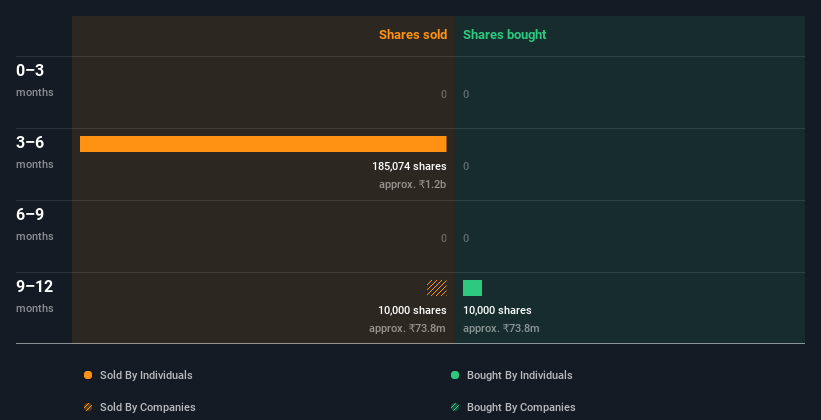
Insiders were net sellers of Bajaj Finance Limited's (NSE:BAJFINANCE ) stock during the past year. That is, insiders sold more stock than they bought.
Although we don't think shareholders should simply follow insider transactions, we do think it is perfectly logical to keep tabs on what insiders are doing.
View our latest analysis for Bajaj Finance
The Last 12 Months Of Insider Transactions At Bajaj Finance
The MD & Executive Director, Rajeev Jain, made the biggest insider sale in the last 12 months. That single transaction was for ₹1.2b worth of shares at a price of ₹6,450 each. That means that an insider was selling shares at slightly below the current price (₹7,295). We generally consider it a negative if insiders have been selling, especially if they did so below the current price, because it implies that they considered a lower price to be reasonable. However, while insider selling is sometimes discouraging, it's only a weak signal. This single sale was 52% of Rajeev Jain's stake. The only individual insider seller over the last year was Rajeev Jain.
Happily, we note that in the last year insiders paid ₹74m for 10.00k shares. But they sold 185.07k shares for ₹1.2b. The chart below shows insider transactions (by companies and individuals) over the last year. If you want to know exactly who sold, for how much, and when, simply click on the graph below!

If you are like me, then you will not want to miss this free list of small cap stocks that are not only being bought by insiders but also have attractive valuations.
Does Bajaj Finance Boast High Insider Ownership?
Many investors like to check how much of a company is owned by insiders. I reckon it's a good sign if insiders own a significant number of shares in the company. It's great to see that Bajaj Finance insiders own 0.2% of the company, worth about ₹8.9b. I like to see this level of insider ownership, because it increases the chances that management are thinking about the best interests of shareholders.
So What Does This Data Suggest About Bajaj Finance Insiders?
There haven't been any insider transactions in the last three months -- that doesn't mean much. It's great to see high levels of insider ownership, but looking back over the last year, we don't gain confidence from the Bajaj Finance insiders selling. So these insider transactions can help us build a thesis about the stock, but it's also worthwhile knowing the risks facing this company. To help with this, we've discovered 4 warning signs (2 are significant!) that you ought to be aware of before buying any shares in Bajaj Finance.
Of course, you might find a fantastic investment by looking elsewhere. So take a peek at this free list of interesting companies.
For the purposes of this article, insiders are those individuals who report their transactions to the relevant regulatory body. We currently account for open market transactions and private dispositions of direct interests only, but not derivative transactions or indirect interests.
Valuation is complex, but we're here to simplify it.
Discover if Bajaj Finance might be undervalued or overvalued with our detailed analysis, featuring fair value estimates, potential risks, dividends, insider trades, and its financial condition.
Access Free AnalysisHave feedback on this article? Concerned about the content? Get in touch with us directly. Alternatively, email editorial-team (at) simplywallst.com.
This article by Simply Wall St is general in nature. We provide commentary based on historical data and analyst forecasts only using an unbiased methodology and our articles are not intended to be financial advice. It does not constitute a recommendation to buy or sell any stock, and does not take account of your objectives, or your financial situation. We aim to bring you long-term focused analysis driven by fundamental data. Note that our analysis may not factor in the latest price-sensitive company announcements or qualitative material. Simply Wall St has no position in any stocks mentioned.
Have feedback on this article? Concerned about the content? Get in touch with us directly. Alternatively, email editorial-team@simplywallst.com
About NSEI:BAJFINANCE
Bajaj Finance
Operates as a deposit-taking non-banking financial company in India.
High growth potential average dividend payer.


